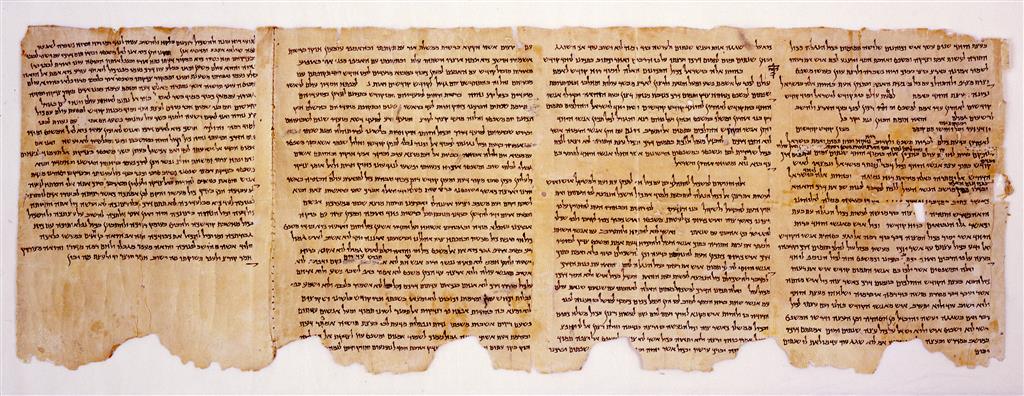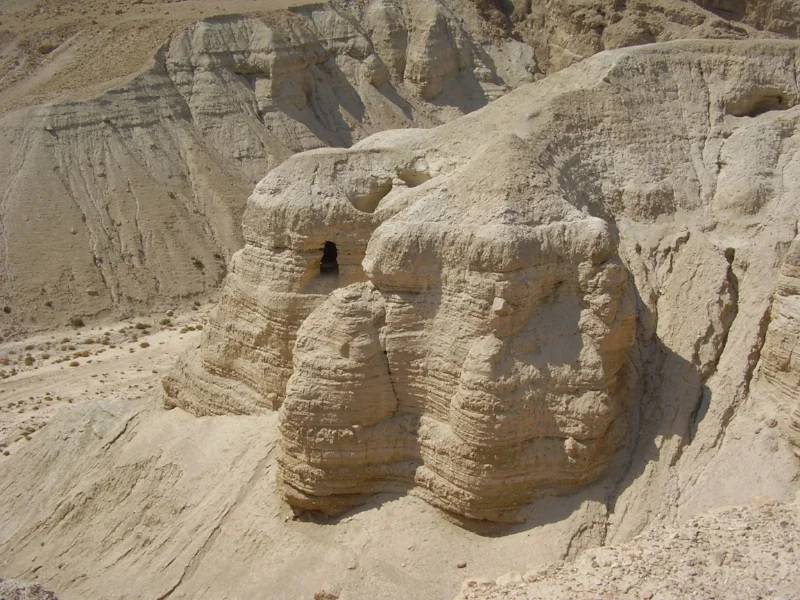"In the field of classical studies, the 2008 publication of The Cambridge Economic History of the Greco-Roman World has effectively ushered in a post-Finleyan era in the study of Greco-Roman economies by incorporating methods developed in the field of New Institutional Economics. In what follows, we examine representative samples of three emergent methodological trends: (1) the turn toward New Institutional Economics in studies of Greece and Rome; (2) Roland Boer’s model of the economy of ancient Israel; and (3) K. C. Hanson and Douglas Oakman’s social-scientific approach in New Testament studies."
Read MoreThe Aramaic Language of the Dead Sea Scrolls: Why it Matters and What Lies Ahead
Genesis Apocryphon Scroll (1QapGen) © The Israel Museum, Jerusalem
Genesis Apocryphon Scroll (1QapGen) © The Israel Museum, Jerusalem
Dr. Daniel Machiela on the linguistic makeup Aramaic at Qumran and the Bible.
Read MoreDissertation Spotlight: Allan Georgia
"Rarely does the evidence available in textual remains invite us to see the underlying, generative way that conflict and competition textured religious cultures in the late ancient world. This study is an attempt to read Jewish and Christian history in the 2nd-3rd centuries, CE by and seeing the points of overlap and confrontation that can be seen beyond the frame."
Read MoreThe Choice of Aramaic and Hebrew: Ideological Considerations
Persepolis tablets with Aramaic. The Oriental Institute, University of Chicago
Persepolis tablets with Aramaic. The Oriental Institute, University of Chicago
Dr. Jonathan Ben-Dov on the ideology of language choice in ancient Judaism
Read MoreEntreaty and Emotion, Theory and Texts: Studies in Second Temple Jewish Prayers
Dissertation Spotlight | Nathalie LaCoste
The River Nile. Michael Gwyther-Jones, 2008.
The River Nile. Michael Gwyther-Jones, 2008.
"Water was not simply part of the background of Jewish experiences in Egypt; rather, it was central to their lives as they developed new perspectives towards the land."
Read MoreThe Evolution and Experience of Repentance at Qumran
Sociolinguistics and the Hodayot (Thanksgiving Hymns)
Unexpected Influences | Beth Berkowitz and Ishay Rosen-Zvi
Beth Berkowitz and Ishay Rosen-Zvi share a book that was an "unexpected influence" upon their academic work.
Read MoreWar, Violence, and Peace in the Dead Sea Scrolls
Why Do We Do This? : A Response to Recent Works on Epiphanius
"Is there something fundamentally flawed or unhelpful about that intellectual judgment? By turning attention toward these other factors, are our authors actually seeking to problematize the style of intellectual history that does intrinsically judge who is the deeper, the more imaginative, the more coherent thinker?"
Read MoreThe Growth of Texts at Qumran: A Forum
AJR and @TWUDSSI’s first forum celebrating the 70th anniversary of the discovery of the Qumran scrolls with pieces by Reinhard Kratz, Drew Longacre, Menachem Kister, Charlotte Hempel.
Read MoreThe Community Rule Manuscript Tradition from Qumran and the Growth of Ancient Jewish Texts
Dr. Charlotte Hempel on tracing the complex textual evolution of 1QS. Celebrating #DSSat70 with @twudssi.
Read MoreCombating Heresy: Attending to Violence in Epiphanius' Panarion
"These violent images of the punishment and execution of dehumanized and embodied cognitive errors are the signs of a religious movement marked by dissent and disorder. Epiphanius, therefore, gives us a shameless and corporeal fantasy of exactly what is not happening in 370s after Julian and under the policies of Valens: the defeat and mastery of all error, whether idolatry or heresy. The contemporary proliferation of spiritual violence called forth the shameless exorcist, who fused disputation with death. "
Read MoreThe Multiple Faces and Phases of Texts at Qumran: Growth, Expansion, and Rewriting in Community Documents
Two New Books on Epiphanius: Biography and Its Limits for Late Antiquity
"In effect, then, both biographies unsettle the very presumption that underpins the genre—that is, confidence in the possibility of recovering enough of the life and experiences of a person to recount as a narrative in writing. The inner life and experiences of Epiphanius here remain bracketed. What is written, instead, is the story of his performed and constructed persona, in the case of Kim, and his iconicity and celebrity, in the case of Jacobs."
Read MoreReflections on the Textual Development of the Pentateuch in Light of Documented Evidence
Dr. Drew Longacre on scribal intervention and innovation in the Pentateuch at Qumran. Celebrating #DSSat70 with @twudssi.
Read MoreOut of the Shadows: An introduction to Young Richard Kim's Epiphanius of Cyprus: Imagining an Orthodox World
"Young’s main instrument in this task is close and contextual readings of key scenes in Epiphanius's master-work, the heresiographic Panarion, as autobiographical moments that allowed Epiphanius to imagine an orthodox world and his own central place in it."
Read MoreInsights into the Growth of Biblical Literature from the Dead Sea Scrolls
Dr. Reinhard Kratz on Qumran and compositional growth of biblical texts. Celebrating #DSSat70 with @twudssi.
Read More“Epiphaniana”
"Andrew takes us from present theory to past subject and ultimately brings us back to the present, rendering us the subject, and challenges us, the reader, to ponder our assumptions about what Late Antiquity was and is and how the pieces of our extant puzzle fit into it."
Read More

















